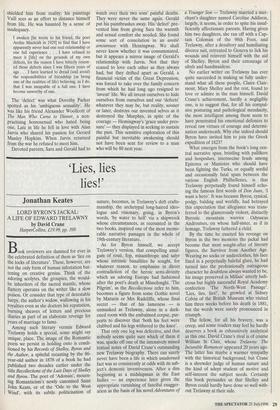'Lies, lies lies!'
Jonathan Keates
LORD BYRON'S JACKAL: A LIFE OF EDWARD TRELAWNY by David Crane HatperCollins, £19.99, pp. 398 Book reviewers are damned for ever in the celebrated definition of them as 'lice on the locks of literature'. These, however, are not the only form of human infestation bat- tening on creative genius. Think of the adoring acolytes, the groupies, the would- be inheritors of the sacred mantle, whose flattery operates on the writer like a slow poison. Or consider that type of detestable harpy, the author's widow, wallowing in his royalties even as she doctors his reputation, burning sheaves of letters and precious diaries as part of an elaborate revenge for years of marriage to fame. Among such literary vermin Edward Trelawny holds a special, some might say unique, place. The, image of the Romantic poets we persist in holding onto is condi- tioned by his Records of Shelley, Byron and the Author, a spiteful recasting by the 86- year-old author in 1878 of a book he had published two decades earlier under the title Recollections of the Last Days of Shelley and Byron. The poet of 'Adonais', mourn- ing Romanticism's newly canonised Saint John Keats, or of the 'Ode to the West Wind', with its subtle politicisation of nature, becomes, in Trelawny's deft crafts- manship, the archetypal long-haired ideo- logue and visionary, going, in Byron's words, 'by water to hell' via a shipwreck whose circumstances, as recounted in the two books, inspired one of the most memo- rable narrative passages in the whole of 19th-century literature.
As for Byron himself, we accept Trelawny's version, that compelling amal- gam of roué, fop, misanthrope and satyr whose intrinsic banalities he sought, for whatever reason, to emphasise in direct contradiction of the heroic semi-divinity which an adoring Europe had fashioned after the poet's death at Missolonghi. 'The Pilgrim', as the Recollections refer to him, becomes a figure from some Gothic novel by Maturin or Mrs Radcliffe, whose final secret — that of his lameness — is unmasked as Trelawny, alone in a dark- ened room with the embalmed corpse, pur- ports to discover that 'both his feet were clubbed and his legs withered to the knee'.
That only one leg was defective, and that nobody seems quite sure which of them it was, sparks off one of the intensively mined textual notes of David Crane's outstanding new Trelawny biography. There can surely never have been a life in which unadorned fact was so consistently at odds with its sub- ject's demonic inventiveness. After a dim beginning as a midshipman in the East Indies — an experience later given the appropriate varnishing of fanciful exagger- ation as the basis of his novel Adventures of a Younger Son — Trelawny married a mer- chant's daughter named Caroline Addison, largely, it seems, in order to spite his insuf- ficiently affectionate parents. Having given him two daughters, she ran off with a Cap- tain Coleman of the 98th Foot, and Trelawny, after a desultory and humiliating divorce suit, retreated to Geneva to lick his wounds and reinvent himself with the aid of Shelley, Byron and their entourage of sibyls and handmaidens.
No earlier writer on Trelawny has ever quite succeeded in making us fully under- stand what all these people, Claire Clair- mont, Mary Shelley and the rest, found to love or admire in the man himself. David Crane's achievement, hardly a negligible one, is to suggest that, for all his compul- sive posturing and pathological mendacity, the most intelligent among them seem to have penetrated his emotional defences to reveal raw virtues of courage and determi- nation underneath. Why else indeed should Byron have invited him to join the Greek expedition of 1823?
What emerges from the book's long cen- tral narrative span, bristling with pallikers and hospodars, internecine feuds among Epirotes or Maniotes who should have been fighting the Turks, or equally sordid and occasionally fatal spats between the various English Philhellenes, is that Trelawny perpetually found himself echo- ing the famous first words of Don Juan, 'I want a hero'. It was because Byron, cynical, podgy, balding and worldly, had betrayed this expectation that allegiance was trans- ferred to the glamorously violent, distinctly Byronic mountain warrior Odysseus Anciroutses, on whose half-sister, as if in homage, Trelawny fathered a child.
By the time he exacted his revenge on Byron in the two memoirs the jackal had become that most sought-after of literary figures, the Survivor from Another Age. Wearing no socks or underclothes, his face fixed in a perpetually baleful glare, he had turned into the professionally outrageous character he doubtless always wanted to be, his image preserved in Millais' utterly ludi- crous but highly successful Royal Academy confection 'The North-West Passage'. 'Lies, lies, lies!', he growled at Sidney Colvin of the British Museum who visited him three weeks before his death in 1881, but the words were surely pronounced in triumph.
The fellow, for all his bravery, was a creep, and some readers may feel he hardly deserves a book as exhaustively analytical as this one. David Crane's rival is of course William St Clair, whose Trelawny: The Incurable Romancer appeared 20 years ago. The latter has maybe a warmer sympathy with the historical background, but Crane is a shrewder judge of human nature and the kind of adept student of motive and self-interest the subject needs. Certainly this book persuades us that Shelley and Byron could hardly have done so well with- out Trelawny at their side.


























































 Previous page
Previous page